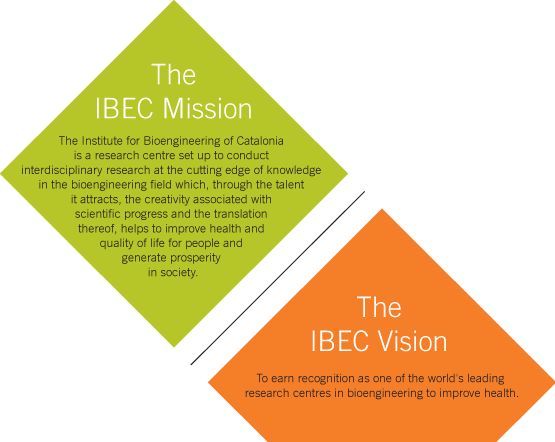IBEC is a research centre whose purpose is to carry out interdisciplinary research at the highest international quality level which, by creating knowledge, helps to improve health and quality of life and generate wealth.
Beneficiaries of the Institute for Bioengineering of Catalonia include the universities, research centres, the scientific community, the business sector that drives research in the bioengineering field, and society in general.
OUR VALUES
Based on IBEC’s mission and vision, our values were identified and defined by the “From values to excellence” project, an action within the framework of the Human Resources Strategy for Researchers according to the European Charter and Code.
It was a participatory process in which several interdisciplinary working groups, made up of management, researchers of all levels and support staff, met between October and November 2016 to identify and define, based on their perception and experience, the values that make the institute unique.
These values help to guide the choices and decisions that our researchers make in their working life.
- Collaboration
Collaboration in the sense of mutual and constant support. Collaboration entails feeling secure, backed and well-represented, and is present at all professional levels, regardless of hierarchy. It means being service-oriented both internally and externally, and predisposed to integrating knowledge and resources for the common good. - Creativity
Creativity is behind the initiatives and research proposals that lead IBEC to succeed and gain international recognition. Creativity stems from curiosity, and is the ability to move outside our comfort zones, valuing and integrating what already exists to transform it into something original that otherwise could not exist.
Creativity is also seen in the integration of different talents and resources to achieve innovative and high-impact results. - Respect
Respect is the basis of collaborative work, relying on acceptance and listening to differences, and allowing both a prejudice-free focus and an approach that’s open to various ideas, as well as building strong and enriching relationships. - Perseverance
Perseverance is the constant pursuit of realistic high performance, keeping the focus on individual and corporate motivation and continuous learning to make processes, results and resources sustainable over time.
It relies on understanding the demands of our positions, knowing how to value both internal and external resources, and turning efforts into a source of positive satisfaction. - (Scientific and social) Responsibility
Responsibility is commitment to the profession, and thus acting according to principles of good faith, integrity, honesty and transparent communication, seeking and maintaining an ethical code of clear behavior, and adhering to best practices in science. It is based on the individual assuming the consequences of decisions he or she makes, being aware of and responsible for them, and reporting them where necessary. It makes scientific freedom possible, and helps us stay reliable and relevant in the research world. - Interdisciplinarity
Our interdisciplinary working environment relies on multi-talented, versatile individuals. It also reflects the ability to contribute from different perspectives, integrating knowledge at both group and individual level.
It is based on the ability to function in more areas than those mastered thanks to training and continuous development, helping to create an adaptable and flexible system which is capable of achieving excellent results even with limited resources. - Openness
Externally, openness means explaining, making things understood and establishing a trusting relationship with partners, employees and society, acting openly and accurately in the delivery and communication of both scientific and non-scientific results.
Internally, openness ensures the consistency and consequence of our own decisions, identifying a frame of reference that enables understanding.


